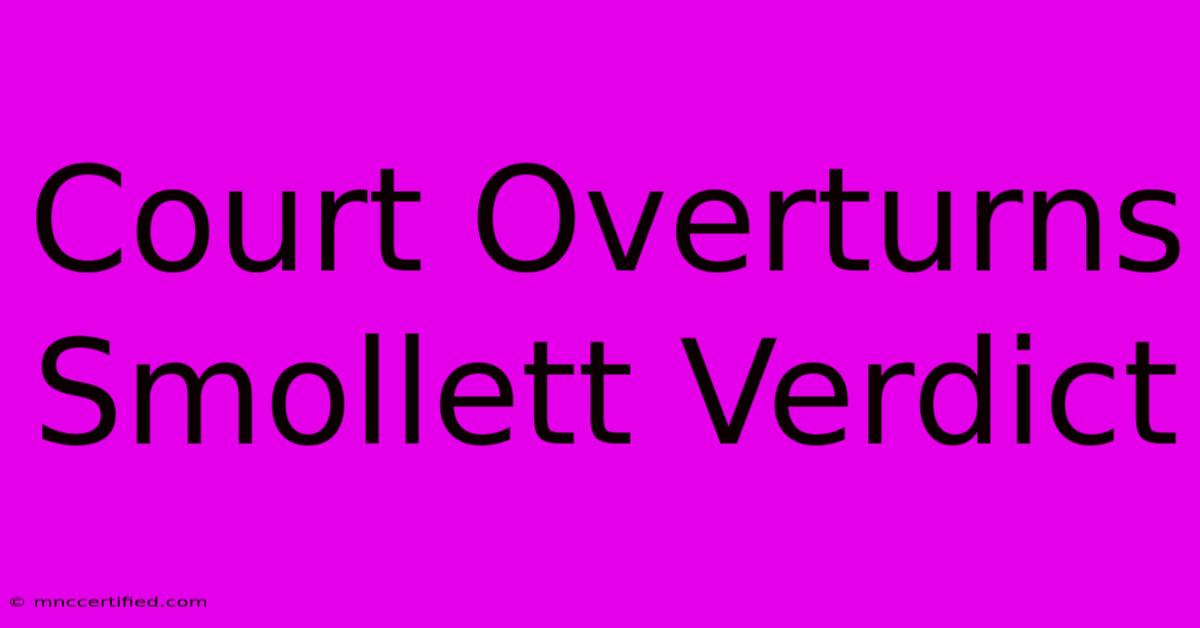Court Overturns Smollett Verdict

Table of Contents
Court Overturns Smollett Verdict: A Deeper Dive into the Case and its Implications
The recent overturning of Jussie Smollett's conviction on charges of staging a hate crime has sent shockwaves through the legal and media landscape. This case, fraught with complexities and contradictions, raises crucial questions about due process, media influence, and the pursuit of justice. This article will delve into the specifics of the case, analyze the court's reasoning, and explore the broader implications of this controversial decision.
Understanding the Original Case: A Recap
In 2019, Jussie Smollett, then an actor on the television show Empire, reported to Chicago police that he had been the victim of a hate crime. He claimed he was attacked by two masked men who yelled racial and homophobic slurs, poured bleach on him, and placed a noose around his neck. The incident sparked widespread outrage and national media attention.
However, the subsequent investigation revealed a drastically different narrative. Police determined that Smollett had orchestrated the entire incident, allegedly paying two brothers to stage the attack. He was subsequently arrested, charged with disorderly conduct, and ultimately found guilty on five counts of felony disorderly conduct. This conviction, however, has now been overturned.
The Overturning of the Verdict: Key Reasons
The appellate court's decision to overturn Smollett's conviction centered primarily on the prosecution's handling of the case. Specifically, the court found that the trial judge had improperly dismissed a juror before the trial began, citing a conflict of interest. This, the court argued, violated Smollett's Sixth Amendment right to a fair and impartial jury.
The Significance of the Dismissed Juror: The court emphasized that the dismissal of this juror, who expressed concerns about the media coverage of the case, potentially prejudiced the defendant's right to a jury of his peers. The argument hinged on the idea that the remaining jury pool may have been subtly influenced by pre-trial publicity and the initial narrative surrounding the incident.
Prosecutorial Misconduct Allegations: While not the primary reason for the overturning, the appellate court also addressed allegations of prosecutorial misconduct, suggesting that the prosecution's handling of certain evidence and witnesses could have been improved. This aspect further contributed to the court's conclusion that Smollett did not receive a fair trial.
The Impact on the Legal System
This decision highlights the importance of rigorous adherence to legal procedures and due process. The court's focus on the juror dismissal underscores the critical role of an impartial jury in ensuring fair trials, even for high-profile cases with significant media scrutiny. The implications reach beyond Smollett's case, serving as a reminder of the potential consequences of procedural errors and the need for careful attention to detail in the judicial process.
Broader Implications and Public Perception
The overturning of Smollett's conviction has sparked intense debate and varied reactions. While some hail the decision as a victory for due process, others criticize it as a miscarriage of justice, arguing that the evidence clearly pointed to Smollett's guilt. The case continues to fuel discussions about the complexities of media narratives, the potential for biases to influence legal proceedings, and the importance of accountability, particularly in cases involving allegations of hate crimes.
Media Influence and Public Opinion: The overwhelming media coverage of the initial incident undeniably shaped public perception. This highlights the potential for media narratives to influence jury selection and the overall fairness of a trial. Moving forward, careful consideration needs to be given to mitigating the influence of media hype on legal proceedings.
The Question of Justice: Even with the verdict overturned, the central question remains: was Jussie Smollett actually guilty of staging the attack? The court's decision addresses procedural issues rather than the substantive guilt or innocence of the defendant. This leaves the public to grapple with lingering uncertainties and conflicting narratives.
Conclusion: Moving Forward
The overturning of Jussie Smollett's conviction is a complex and multifaceted legal event with wide-ranging implications. It raises vital questions about due process, the impact of media influence, and the pursuit of justice within a system under intense public scrutiny. The case serves as a critical reminder of the importance of procedural accuracy and the potential consequences when those procedures are not meticulously followed. While the legal battle may continue, the case's enduring legacy will be its contribution to the ongoing conversation about fairness, justice, and accountability in the American legal system.

Thank you for visiting our website wich cover about Court Overturns Smollett Verdict. We hope the information provided has been useful to you. Feel free to contact us if you have any questions or need further assistance. See you next time and dont miss to bookmark.
Featured Posts
-
Cleveland Browns Raise Whiteheart
Nov 22, 2024
-
Mike Mcdonald Fisher Investments
Nov 22, 2024
-
Griffin Insurance Statesville Nc
Nov 22, 2024
-
Ankle Monitor While Out On Bond
Nov 22, 2024
-
Human Animal Bond Certification
Nov 22, 2024